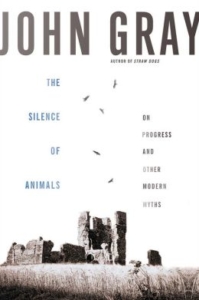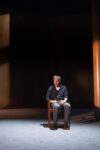John Gray wants you to know a few things: You are insignificant; humanity is insignificant; and all the ideals you may blithely believe in—reason, progress, self-realization — aren’t just weak-kneed poppycock, they’re downright nasty. “Like cheap music,” Gray writes in his newest work, Silence of the Animals, “the myth of progress lifts the spirits as it numbs the brain.” This book, rest assured, does just the opposite: it enlivens the brain as it masticates, swallows and then defecates out the spirit.
Since his earlier (and better) work, Straw Dogs, Gray has been on a mission to rain fire on any belief that has even the slightest scent of human exceptionalism. In that book, he refused to make any easy alliances, skewering not just humanism, but also many fellow foes of humanism, like Heidegger, Wittgenstein and ‘postmodernism’ writ large. When you read Gray, you should leave any known fault lines behind; for all of Gray’s flaws, there’s no denying that he thinks on his own two feet.
Gray’s new work is certainly an excellent polemic. It has all the witty brutality and curmudgeonly barbs that aficionados of the genre will admire. And with all this fun, who cares that ‘progress’ is hardly the sacred cow Gray pretends it is? Polemics should be judged with a different criteria than more delicate essays, just as one should approach Rambo differently than Haneke. Whether it’s John Gray bruising humanists, romantics and Christians, or John Rambo machine-gunning baddies, the joy is in the thoroughness of destruction, not the nuance.
In this book, as with those muscular action films of the 1980s, you should be prepared to endure some agonizingly old-fashioned, macho intellectualism. In his chapter on progress, for example, we hear a lot about warfare, genocide and fascism, but nothing about civil rights, the welfare state or women’s liberation, obvious rejoinders to his critique of progress, and something he apparently hasn’t found fit even to mention. And of the dozens of authors he discusses, I counted no women — they’re apparently only relevant when joining their more notable husbands in suicide (something that happens here with peculiar frequency).
Flaws aside, stick with this book. It’s well worth it. It’s best to pretend Gray is your cantankerous grandfather; once you accept his foibles, you’ll begin to realize that he is actually wiser than you are. All his fun nastiness, it turns out, is only half the game: after he has demolished any stale crumb of hope, he then tries to teach us to live with that emptiness. And not just to live with it — but to embrace it, and even celebrate this bleakness and terror. “Accepting that the world is without meaning, we are liberated from confinement in the meanings we have made . . . This nothingness may be our most precious possession, since it opens to us the world that exists beyond ourselves.” Gray would be a stoic if he didn’t think the stoics were too damn soft.
But what exactly can we find beyond ourselves? Gray begins the third and by far best essay, “Another Sunlight,” with J. A. Baker, an obscure manager of a local Automobile Association, who dedicated much of his life to following the peregrine falcon through the English countryside. Baker, no David Attenborough, gives us this:
I shut my eyes and tried to crystallize my will into the light-drenched prism of the hawk’s mind. Warm and firm-footed in the long grass smelling of the sun, I sank into the skin and blood and bones of the hawk . . . Like the hawk, I heard and hated the sound of man . . . We hate their suddenly uplifted arms, the insanity of their flailing gestures, their erratic scissoring gait, their aimless stumbling ways, the tombstone whiteness of their faces.
Baker sought to come as close to the consciousness of the peregrine falcon as possible, and to take flight from the confines of human consciousness. We can admire this attempt even while recognizing its limits. “If he could not exit from this world, he did step close to the edge of human vision.” Gray writes, “Without looking at things through a bird’s eye, he peeled away enough of himself to be able to look out through eyes that were no longer those he had had before.” With Baker, the experimental and experiential blend together (as with the French word, expérience), and we can revel in the provisional, groping, self-fashioning ecstasy of our wily minds.
Where does this leave us? And what exactly is the point in hallucinating the minds of these flighty beasts? Gray wants us to develop rituals of the mind that will help us experience self-alienation, cultivating a radically anti-humanist humility. Ironically, both Christianity and Romanticism, perhaps the two movements Gray most despises, offer this possibility. Yes, Christianity often leads to tribalism and self-importance, but it also teaches original sin, and in its more mystical forms, celebrates the ecstatic embodiment of something beyond the human. And while Romanticism can be solipsistic and precious, it also seeks to internalize a natural world we can never fully grasp: Goethe sounded very much like Baker when he journeyed to Italy, seeking to find himself in the objects that lay beyond him.
Gray, however, has no patience for these schools. The doctrine of original sin still relies on an ideal, and Romanticism demands that there is indeed a self to find. Gray insists that we reject all of these myths. Instead, we should pursue what he calls ‘godless-mysticism,’ which “cannot escape the finality of tragedy, or make beauty eternal. It does not dissolve inner conflict into the false quietude of any oceanic calm. All it offers is mere being.” If John Gray didn’t exist, Joseph Conrad would have had to invent him.
This post may contain affiliate links.









